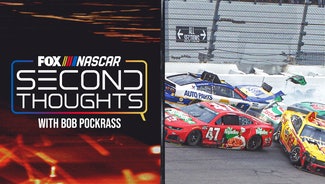
NASCAR makes smooth transition to fuel injection
Jack Roush once was the most hands-on team owner in the NASCAR garage.
It wouldn't be odd to walk into the garage on a race weekend and see Roush under the hood, fiddling with a carburetor.
But with the advent of electronic fuel injection in the Sprint Cup Series this season, Roush jokes that the level of technology finally has exceeded his ability to tinker.
After winning pole position for the Daytona 500 on Sunday, Roush Fenway Racing driver Carl Edwards joked that one of the keys to the team's great start to the season is that ''Jack hasn't been doing much carburetor tuning.''
Roush, sitting next to Edwards in the interview session, had to acknowledge it was true.
''They're working me closer to the door,'' Roush said. ''The more this technology expands, the less there is for a dinosaur like me to do. I'm just a comedian right now.''
After clinging to carburetors for decades after they were regularly found in passenger cars, NASCAR finally is making the switch to fuel injection.
It was a major change for teams and their engine builders, making right now an exciting time for guys like engine builders. Doug Yates, the CEO of Roush Yates Engines, said he has more data than ever to analyze and can make far more adjustments to affect the engines' performance.
''It's very exciting from an engine builder and an engineer's perspective, having new technology in NASCAR.'' Yates said. ''And it's our job to hopefully make it seamless.''
The transition mostly has flown under the radar during Daytona Speedweeks so far - a good sign that there aren't any major issues.
''It's out there, and it's quiet,'' said Robin Pemberton, NASCAR's vice president of competition. ''Knock on wood, but it just goes to show you how hard everybody's working.''
Pemberton said the move to fuel injection helps make NASCAR more relevant, especially to automakers backing the sport. It also gives teams a little more leeway to tune their engines - to a point.
''There are tools in the toolbox that we are not using with this system, for obvious reasons,'' Pemberton said. ''And that is to keep the drivers driving and the crew chiefs working on their setups.''
Pemberton expects teams to try to get away with something at some point. There has been speculation that allowing electronic fuel injection could open the door for a team to come up with a hidden traction control system, giving them an illegal advantage.
''That's what everybody says,'' Pemberton said. ''But the truth be known, that's probably not your biggest problem. The biggest problem is the one you don't know about, right?''
NASCAR officials now have electronic devices that plug into teams' computer systems to make they aren't altering their software. And if a team gets caught messing with its fuel injection system, Pemberton says the penalty will be harsh.
''It'll be a top of the line penalty,'' Pemberton said.
Driver Jeff Burton said fans probably won't notice the change.
''From a performance standpoint, I am not sure there is going to be a major difference,'' Burton said. ''I think fuel mileage should increase a little bit; performance should increase a little bit, probably not enough for the fans to really be able to tell.''
Burton said using fuel injection will help the automotive industry, making it more likely that technology tested on the track eventually will make its way into passenger cars. But Burton acknowledges it has been a burden to the teams.
''Teams have had to spend a lot of money, put a lot of resources to it, not just in money, so yes it is tough,'' Burton said. ''It also comes at a time where the economy is down, so it is not at the best time. Nonetheless, it is something that had to happen.''
The idea of switching to fuel injection wasn't universally accepted right away. Last year, driver Brad Keselowski was fined by NASCAR officials for criticizing the move, saying the technology being introduced still lags far behind street cars and ''does nothing for the sport except cost the team owners money.''
Asked about his comments last week, Keselowski kept quiet.
''I said as much as I needed to say,'' Keselowski said. ''As much as I could afford to say.''
The transition also was an issue for driver Robby Gordon, who owns his own team. Gordon said the switch to fuel injection made his old intake manifolds obsolete, forcing him to buy new ones. Gordon thinks the old manifolds could have been modified to work with the new system.
That complaint aside, Gordon thinks the introduction of fuel injection is good for NASCAR. And he isn't worried that NASCAR will have a hard time policing cheaters.
''I'm not worried about it,'' Gordon said. ''These guys that tune these engines, they know how to adjust the power band to make the power come on at certain things and make the drivability (better). I'm sure you're thinking traction control and all that, which is the first thing that everybody thinks. But these engine builders are pretty clever. And you don't have to have traction control.''










